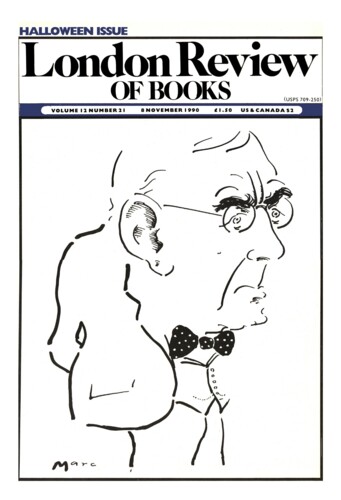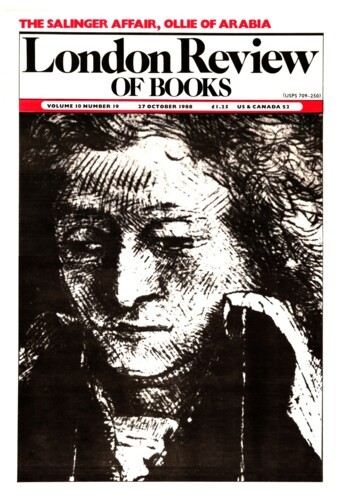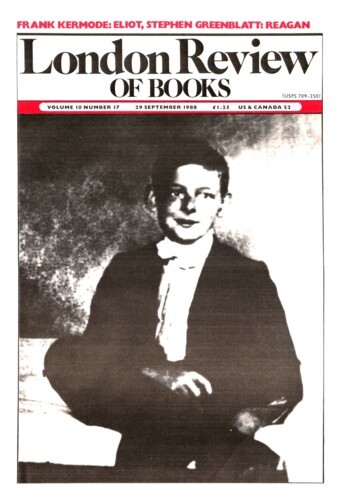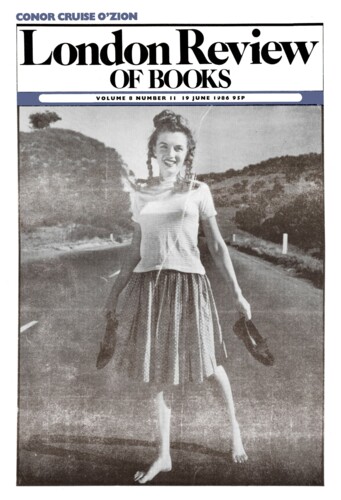Stephen Greenblatt
Stephen Greenblatt’s most recent book is Hamlet in Purgatory. He is working on a biographical study of Shakespeare.
Loitering in the Piazza
Stephen Greenblatt, 27 October 1988
Giovanni Levi’s Inheriting Power bears a generic resemblance to those recent historical studies that illuminate the lives of European peasants by isolating and reconstructing a single resonant story. The best of these microhistories – Carlo Ginzburg’s The Cheese and the Worms and Natalie Zemon Davis’s The Return of Martin Guerre – succeed in making their stories what Kenneth Burke calls ‘representative anecdotes’, reflections of reality that are inevitably selections of reality. The selections work if they manage to convey a sense of both resonance and particularity. The particularity functions rhetorically to persuade the reader that she has made contact not with another statistical table or an allegorical idea but with a palpable life and its concrete material world (‘to take note’, Hal tells Poins, ‘how many pairs of silk stockings thou hast, viz., these, and those that were thy peach-color’d ones’). The resonance functions to raise this enumeration of particulars above the trivial or the random, to evoke what Yeats called the emotion of multitude, to make the anecdote representative.’
That’s America
Stephen Greenblatt, 29 September 1988
The 15th-century classic of paranoid witch-hunting, Kramer and Sprenger’s Malleus Maleficarum, provides a convenient gloss on the word ‘glamour’. Witches, the Dominican inquisitors tell us, can rob a man of his penis or at least make him think that he has been robbed. The victim wakes up in the morning, looks down and sees nothing there – or rather he sees, where his penis should be, what is called a ‘glamour’.’
Splenditello
Stephen Greenblatt, 19 June 1986
A few months ago, in California, I had a message that a New York Times reporter had telephoned. I conjured up a half-dozen possible reasons for the call, all of them unabashedly narcissistic, only to find, when I finally reached her, that the reporter wanted to know what I thought of a scholarly book that had just been published. Such a question from the press is highly unusual in the United States: American newspapers rarely interest themselves in scholarship, and our reporters, like our politicians, have failed to develop a public discourse that can accommodate ideas of a complexity greater than that conveyed in advertising jingles. Even papers that take themselves very seriously indeed regard cultural and intellectual life as generally beyond the pale of the ‘news’. (The exception proves the rule: when the New York Times Sunday Magazine decided recently to run an article on deconstruction, the reporter wrote as if he couldn’t believe not only the outlandishness of the intellectual movement he was purporting to chronicle but the peculiarity of writing about it at all.)
Pieces about Stephen Greenblatt in the LRB
They rudely stare about: Thomas Browne
Tobias Gregory, 4 July 2013
It is still often proposed that religion and science need not conflict. Stephen Jay Gould held that they occupy ‘non-overlapping magisteria’: science deals with questions of fact,...
Who wouldn’t buy it? speculating about Shakespeare
Colin Burrow, 20 January 2005
As I was reading Stephen Greenblatt’s biography of Shakespeare on the train there was a woman sitting near me doing a deal on the phone. She was getting agitated. ‘But I have to...
Touches of the Real: Stephen Greenblatt
David Simpson, 24 May 2001
New historicism was a 1980s thing, a literary critical movement that took shape on the West Coast, becoming established there and elsewhere as what one could talk about after having talked for...
Elegant Extracts: anthologies
Leah Price, 3 February 2000
Anthologies attract good haters. In the 1790s, the reformer Hannah More blamed their editors for the decay of morals: to let people assume that you had read the entire work from which an...
Point of Wonder
A.D. Nuttall, 5 December 1991
‘Greece, having been subjected, subjected her wild conqueror and introduced culture into boorish Rome.’ The poet Horace, himself a Roman, can take a stylish pleasure in describing the...
Hail to the Chief
Frank Kermode, 10 January 1991
As befits an undisputed chef d’école, Stephen Greenblatt includes in this latest collection an account of his own ‘intellectual trajectory’, which features a decisive...
Open the curtain and see their puppets play
Peter Burke, 5 January 1989
Like sociology and anthropology, the study of art and literature, especially the art and literature of the Renaissance, seems to be taking a historical turn in the Eighties. To a historian like...
Read anywhere with the London Review of Books app, available now from the App Store for Apple devices, Google Play for Android devices and Amazon for your Kindle Fire.
Sign up to our newsletter
For highlights from the latest issue, our archive and the blog, as well as news, events and exclusive promotions.




